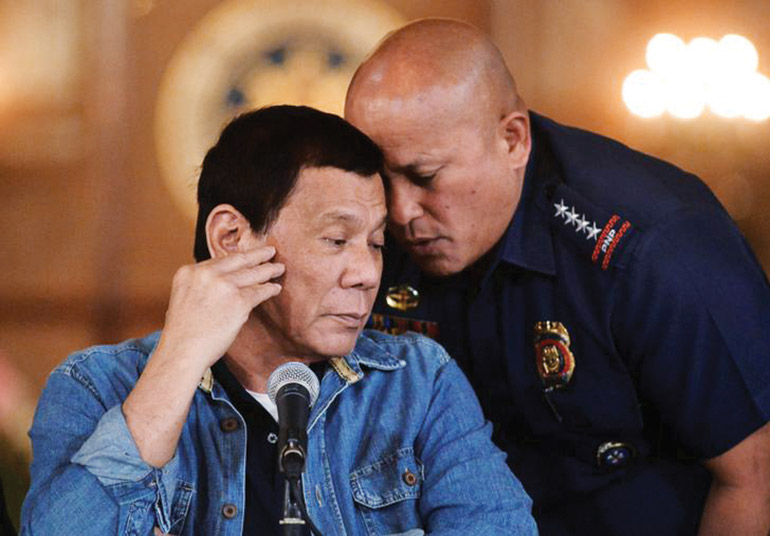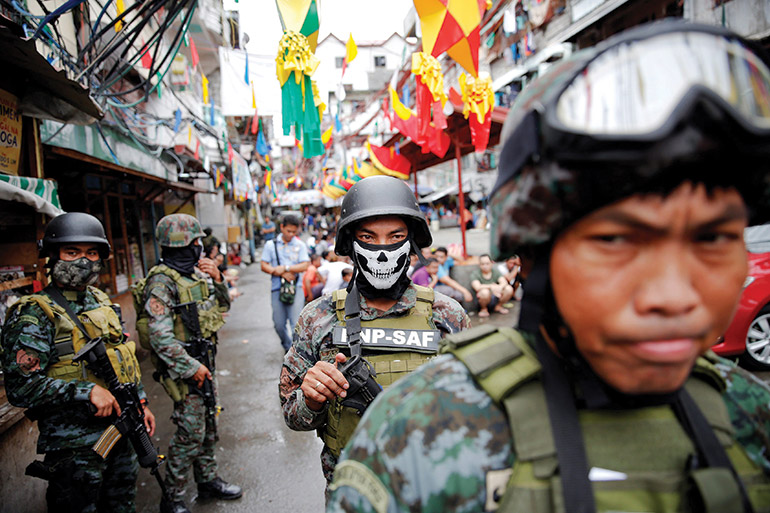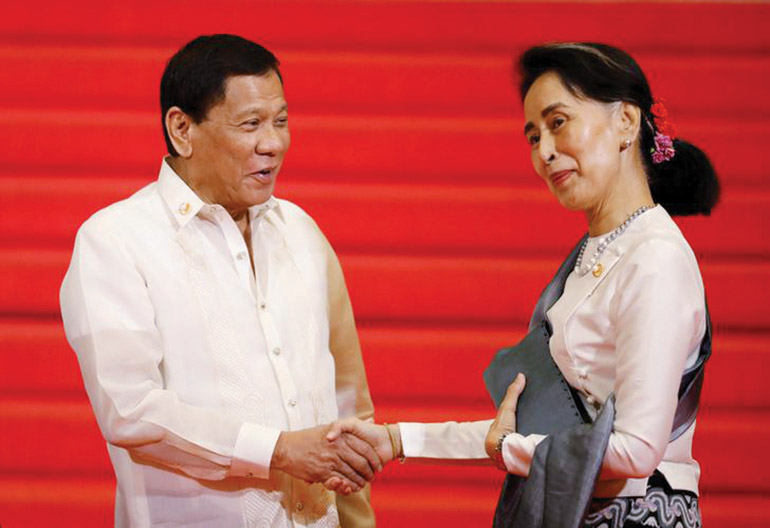For those who have watched the foul-mouthed Filipino’s rise with horror, the presidency of Rodrigo Roa Duterte appears to be little more than the latest in a long line of tin-pot dictators devastating the most vulnerable in their community to shore up their own authority. Since taking office a year ago this month, Duterte has presided over the extrajudicial killings of more than 8,000 men and women supposedly linked to the Philippines’ drug epidemic. But behind this indefensible, blood-soaked veil, the so-called Punisher’s first year in office has seen him struggling to reform a stagnant and divided system.
Perhaps nowhere is the disconnect between the Duterte disparaged by the West and the Duterte beloved by Philippine voters more pronounced than in the international media. The man splashed across the pages of the New York Times bears little resemblance to the one who still holds the approval of nearly eight out of ten Filipinos. According to Aries Arugay, associate professor in political science at the University of the Philippines, neither Duterte nor his supporters care about the censures of the world press.
“He’s not like other Filipino presidents who thought more about their prestige abroad than their prestige at home,” he said. “He doesn’t care what people on the outside think.”
Mark Thompson, director of the Southeast Asia Research Centre at City University of Hong Kong, said that Duterte’s utter disregard for the approval of the Western world has resonated with those in the Philippines who still rankle at the US’ influence over its former colony.
“People have this misleading impression that nationalism is not very important in the Philippines, particularly because of the supposed stronger pro-American view of many Filipinos that shows up in many surveys,” he said. “That’s true to some degree, but it also misses the flipside of US colonial power.”
As the first Philippine president to rise from the nation’s neglected southern region of Mindanao, Duterte’s disdain for US moralising takes on an edge that cannot be dismissed as mere belligerence. Speaking on the eve of last year’s Asean summit in Laos, Duterte hit back at then-US President Barack Obama’s repeated criticism of his anti-drug campaign by recalling the massacre of hundreds of Muslim men, women and children at the hands of US troops in the early years of the 20th century.

“He really captured media attention for his shooting straight from the hip rhetoric, but if you really examine his words, they’re words asserting sovereignty, they’re words asserting that we’re not going to bow down to the US as the Big Brother anymore,” said Bernadette Ellorin, chairperson of the US chapter of Bayan, a Philippines-based left-wing alliance of workers’ organisations. “And to hear a Philippine president say that, even if it’s just words, is unprecedented – and positive.”
In the months that followed, however, Duterte’s proud stance proved to be short-lived. As his overtures toward China failed to win much in the way of material support – and the 2016 US election produced a president less inclined to comment on his allies’ atrocities – Duterte began to take a softer tone with the world powers. When he chaired the 2017 Asean summit, hosted by the Philippines in April, the world was presented with a very different side of the president.
“I saw two different people,” said Ramon Beleno III, a political science professor from Ateneo de Davao University in Duterte’s home city. “In Laos, the president was very aggressive. His words were very strong against both China and the US… But a few months passed, and I think he was able to realise his role as a statesman – that there was no need to cut ties or even distance oneself in order to fully implement his plan for a more independent foreign policy. I saw a more mature Duterte during the Philippines’ Asean chairmanship.”
Perhaps nowhere has this shift been more obvious than in Duterte’s response to China’s continued efforts to dominate the South China Sea. Despite an early victory for the Philippines in an international tribunal at The Hague, the man who once promised to ride a jet ski to the disputed Spratly islands with a Philippine flag in his hand has since used his country’s chairmanship of the recent Asean Summit to block all mention of China’s ongoing reclamation projects. According to Beleno, it was a move born more from pragmatism than pride.
“If push comes to shove, he wondered what the Philippines can do against the military forces of China,” he said.
Long Road to Peace
It’s possible that no issue has been more thoroughly eclipsed by Duterte’s savage war on drugs than his efforts to negotiate peace between the Philippine government and dual insurgencies in the nation’s south – a Maoist coalition and a Muslim secessionist movement that both turned violent during the reign of dictator Ferdinand Marcos in the late 1960s.
While stressing that Bayan in no way supported Duterte’s unrelenting crackdown on those most vulnerable to the Philippines’ drug epidemic, Ellorin maintained that the one-sided narrative peddled by international media only served to undercut the more nuanced reality of the president’s domestic policy.
“I think the corporate media is crafting a very dangerous and very unbalanced narrative to the international community on the Duterte administration,” she said. “While there has been wall-to-wall coverage and drum-beating on Duterte’s drug war, there has been zero coverage on the peace process that the Duterte administration is responsible for resuming. And that’s something that actually stands to affect, in a positive way, tens of millions of Filipinos who are suffering from poverty and landlessness and joblessness.”
A man trusted by both members of Mindanao’s Muslim Moro community and many of the groups tied to the communists – Duterte was once a student of the founder and leader of the Communist Party of the Philippines, Jose Maria Sison – Duterte’s promise to pursue an end to Asia’s longest-running communist insurgency played a prominent part in his bid for the presidential palace.

Ellorin said that Duterte’s willingness to engage with the long-maligned communists, including a recent statement suggesting that the administration was open to land redistribution as a potential agrarian reform, was unprecedented amongst Philippine presidents.
“What’s being negotiated on the table, these are not major, transformative things – it’s just the ability for peasants to own land and basically to modernise and industrialise agriculture in the Philippines,” she said. “I think these are basic things people want.”
Despite popular support, the president appears to be playing a dangerous game. After 50 years of bitter civil war that has claimed the lives of more than 40,000 Filipinos, both the Armed Forces of the Philippines and Duterte’s beloved police force remain deeply resentful of the president’s ties with the far left. And in a nation that is no stranger to military takeovers, Thompson said Duterte has every reason to be nervous.
For 50 years of a civil war, they’ve been indoctrinated to basically kill rebels without question – and now you’ve got a president saying we need to sit down and talk to them.”
“Duterte is taking a risk and he knows that,” he said. “It’s also the reason he spends a lot of time with the military: to make sure they’re on his side.”
According to Ellorin, it is a precarious position for the president so often touted as the Philippines’ strongman.
“Duterte is trying to balance his alliances right now with… anti-imperialist groups as well as being commander-in-chief of a military that is growing more and more disgruntled by his policies – especially in the sense of reopening talks with the revolutionary government,” she said. “That is something that the Armed Forces of the Philippines absolutely despises. For 50 years of a civil war, they’ve been indoctrinated to basically kill rebels without question – and now you’ve got a president saying we need to sit down and talk to them.”
Thompson said that Duterte’s peace process – if successful – could be the one area where the charismatic leader affects real, lasting change during his presidency.
“It’s hard for me to tell whether a deal can actually be made, but certainly Duterte seems very serious about it,” he said. “So one would have to say that the chances of something being settled maybe even this year are probably pretty good.”
Business as usual
Aside from his apparent complicity in the swathe of extrajudicial killings conducted under his presidency, perhaps the most widespread condemnation of Duterte’s first year in office has been that, for all his talk of breaking down the established order, there has been little sign of real institutional change. Apart from a few high-profile dismissals over suspicions of graft, Duterte has done little to follow through on his pledge to weed out corruption in the Manila elite and the institutions that serve it. No anti-corruption body has been formed and, despite the high-profile kidnapping and murder of a South Korean businessman in January at the hands of dirty cops, there have been no signs of reform within the ranks of Philippine law enforcement. According to Arugay, it is this emphasis on Duterte’s personal authority, rather than systemic reform, that has undercut the promises made during the former mayor’s campaign.
“If I’m going to make a criticism over President Duterte, it’s that there is no long-term vision,” he said. “It’s just change in order to improve the welfare of the ordinary worker… He’s not building any institutions – the party is still the old party, just recycled – and he doesn’t look too far into the future. And that increases uncertainty.”
One sector that has embraced Duterte’s apparent unwillingness – or inability – to shake up the status quo has been the Philippines’ flourishing business community. Initially fearful of Duterte’s mercurial temperament, the country’s business leaders welcomed the president’s early decision to reaffirm the economic policies of the departing administration of Benigno Aquino III – as well as a proposal to strip away protectionist clauses within the constitution that restrict foreign ownership of land and local industries.
He was actually providing social services that were urgently needed by the people… that was Duterte as the mayor of Davao”
For those who took to Duterte’s pledge to fight for the wellbeing of ordinary Filipinos, though, the president’s evident policy of ‘business as usual’ has been a heavy blow.
“I think while he in rhetoric has touted sovereignty, his actual economic policies thus far don’t reflect that,” Ellorin said. “He is basically continuing the same neoliberal economic paradigm of the previous administration which, unfortunately, is greater privatisation, liberalisation and deregulation of the economy.”
Perhaps it was this reassurance that Duterte had in mind when he quoted former US President Abraham Lincoln in his inaugural speech, quashing suspicions that the maverick from Mindanao – a self-proclaimed socialist – might shake up more than just the political order.

“From Lincoln I draw this expression,” he said. “‘You cannot strengthen the weak by weakening the strong; you cannot help the poor by discouraging the rich; you cannot help the wage earner by pulling down the wage payer; you cannot further the brotherhood by inciting class hatred among men.’”
While the Philippine economy has consistently received praise for being one of the fastest growing in the world, its critics argue that this has come alongside widening income disparity and an ever-growing underclass. For some, Duterte’s capitulation to international corporations has been a bitter betrayal.
“His 20 or so years as the mayor of Davao City meant that Duterte had a lot of policies that were actually popular and pro-people and very beneficial for the rural poor, especially in terms of food assistance to farmers who were hungry.” said Ellorin. “He was actually providing social services that were urgently needed by the people… That was Duterte as the mayor of Davao. Duterte as the president, however, is a different story,” she added.
Despite this criticism, it must be said that Duterte has been willing to fight against the big end of town on occasion. His decision to shut down more than half of the nation’s nickel mines to halt environmental degradation was met with fury by the mining industry. As the world’s largest supplier of nickel ore – China alone imports 97% of its nickel from the Philippines – the decision is expected to have far-reaching implications for the world’s stainless steel production, which relies heavily upon the commodity. But for the Philippines, where the mining industry contributes less than 1% to the domestic economy, it is an environmental hazard they claim they can live without.
Duterte’s struggle to reform the widespread practice of contractualisation in the Philippines’ labour market has proved a tougher fight. One of the would-be president’s more popular campaign promises was to abolish the illegal practice of constantly hiring and re-hiring workers on a contract basis to avoid having to provide mandated paid leave and social security. The Department of Labour and Employment has placed the number of Filipino workers caught in such precarious arrangements at 1.3 million people out of 69.4 million people above the age of 15. Although Duterte has pledged to wipe out the practice by the end of 2017, resistance from the business sector has been fierce.
“If something happens on that front, if he takes a serious step forward on that front, I’ll have to say that maybe he is serious about implementing a social agenda alongside these basically neoliberal economic policies – which have functioned pretty well in terms of growth rates for the last 20 years,” Thompson said. “But his talk about social reforms – to be serious, he’s going to have to take some steps the business sector doesn’t like.”


